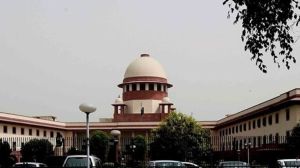I am afraid of frogs, ghost stories and my wife
PUNE, Aug 22: The man who is widely regarded as the architect of the 1971 victory over Pakistan is afraid of a frog but believes that the...

PUNE, Aug 22: The man who is widely regarded as the architect of the 1971 victory over Pakistan is afraid of a frog but believes that the Line of Control (LOC) dividing Kashmir should be turned into an international border. This from Field Marshal SJHFC (Sam) Manekshaw himself as he delivered the sixth Anand Bhadkamkar Memorial Lecture to a packed gathering at the Mahratta Chamber of Industry and Agriculture on Sunday evening.
Charming and witty, the distinguished soldier was of the opinion that the Line of Control should be turned into an international border as a solution to the Kashmir problem. “If Pakistan-occupied-Kashmir is inducted into the India union then we will inherit one million people who have no loyalty to us. It would be the biggest problem that we could take on. I believe the LOC should be turned into an international border,” he said, replying to a query from the audience.
But to FM Sam Manekhsahw the future looks promising as he believes that someday India and Pakistan would probably be united just as the two Germanys were united. “Maybe your generation will see such a day,” he hoped.
But all through it was an incisive mind that had the audience rolling in the aisles with flawless humour. “I am afraid of a frog, ghost stories and my wife,” he revealed as he elucidated on the qualities of leadership, the one quality, he feels, the country lacks. “Professional competence, moral and physical courage, absolute impartiality and loyalty are the ingredients of good leadership. What we lack as a nation is discipline and that is the most essential quality to lead others,” he said.
Narrating incidents from his career the soldier also revealed that when war with Pakistan was first suggested at a cabinet meeting on April 25, 1970 he had refused the political leadership. “We had only 13 operational tanks and we were not prepared logistically.” It was his personal rapport with then Prime Minister Indira Gandhi that helped him convince the cabinet. “But there is a thin line that divides being dismissed and a Field Marshal’s rank,” he said.
Commenting on the delicate balance that the military leadership and civilian authority has to maintain, he pointed out that although civilian authority was supreme, politicians must have a certain degree of professional competence. “A defence minister once asked me what a habitjher is. I told him that it was a howitzer’ and how important it is for our troops battling the enemy.” Such incidents, he said, spoke volumes of the present leadership’s inability.
As far as the Kargil operations were concerned, FM Manekshaw felt that though the present General was a thorough gentleman and a good officer he should have been more aggressive. “Intrusions, he said, “take place all the time and we have to patrol the borders constantly.”
But all things said and done there were hints at mischief as the Field Marshal got back to discussing courage, albeit in a different strain. “My wife and I share different bedrooms but sometimes at dinner she tells me ghost stories that scare me. On those days I get into my wife’s bedroom. I wonder why she tells me ghost stories so often!” The audience, needless to say was left hanging on to every word.
On the occasion, the Anand Bhadkamkar Foundation donated Rs one lakh to the Army Welfare Fund and Rs 50,000 each to Manavya Pune which works for the welfare of commercial sex workers and their children and Aurangabad based HALO Medical Foundation.
The SICOM-Anand Bhadkamkar awards were given away by FM Manekshaw to Marathi a journalist who helped popularise industrial and economic topics. Ravindra Doshi, editor of Arthasanwad (a bulletin of the Marathi Artha Parishad) was awarded Rs 25000 along with a citation for his contribution.
The Foundation awarded P R Joshi, director, UTI Institute of Capital Markets with Rs 15000 and Chandrashekhar Tilak, deputy vice-president of national securities depository Ltd with Rs 10000 along with citations. Industrialists Baba Kalyani and Rahul Bajaj addressed the audience.



- 01
- 02
- 03
- 04
- 05




























